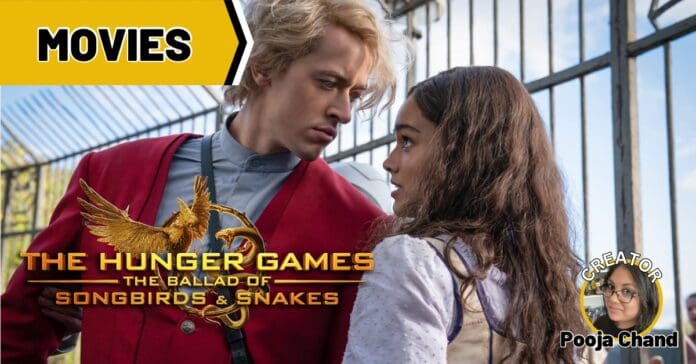Share this
In 2020, Suzanne Collins wrote and released a brand new prequel novel to The Hunger Games trilogy which had concluded just ten years prior. There was no doubt that the book would receive a film adaptation and now that it is finally here, fans are raving about it. The story of The Ballad of Songbirds and Snakes follows eighteen year old Coriolanus Snow during the tenth annual Hunger Games. When Coriolanus is assigned to mentor Lucy Gray Baird, a tribute from District 12, he is determined to have her win no matter the cost. He finds himself at a crossroads with conflicting feelings of romance and a drive for success, forcing him to make a choice. The following review is spoiler-free with regard to both the film and the book.
Read Also: Girl Power Shines Bright In ‘The Marvels’
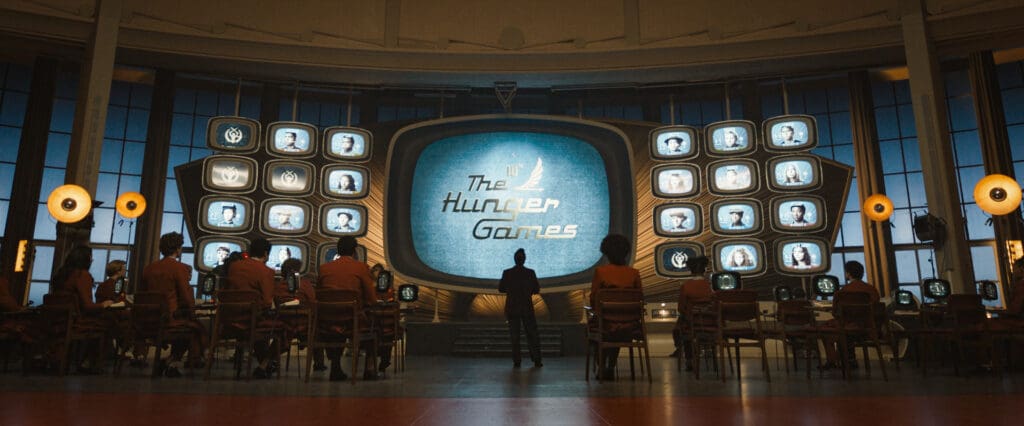
The Ballad of Songbirds and Snakes took one of the most hated characters in Young Adult fiction, and gave readers access to the perspective and inner monologue of his younger self. Collins knew what she was doing when she wrote the book and to have her vision be transferred to the big screen once again brought back an obsession many fans had with The Hunger Games. While the film definitely focuses on Snow, we’re also introduced to important characters that impact that outcome of the story, leading into what we know to be Katniss’ story. Performances by Viola Davis, Peter Dinklage, Jason Schwartzman, Hunter Schafer, and Josh Andrés Rivera are all equally fascinating to watch on screen, and they each give us a taste of their world through their own individual characters.
But there is something so eerie about getting to know the villain of a violent and heart wrenching story, especially in the way that Coriolanus Snow is presented throughout the film itself. And for all those who find themselves falling head over heels for Tom Blyth’s portrayal, just know that this was most likely the intended goal. The film lets us watch a much more charming version of Snow, and convinces the audience to get lost into the way he interacts with others and the way he fights to accomplish his goals, as if he’s trying to do good in the world.
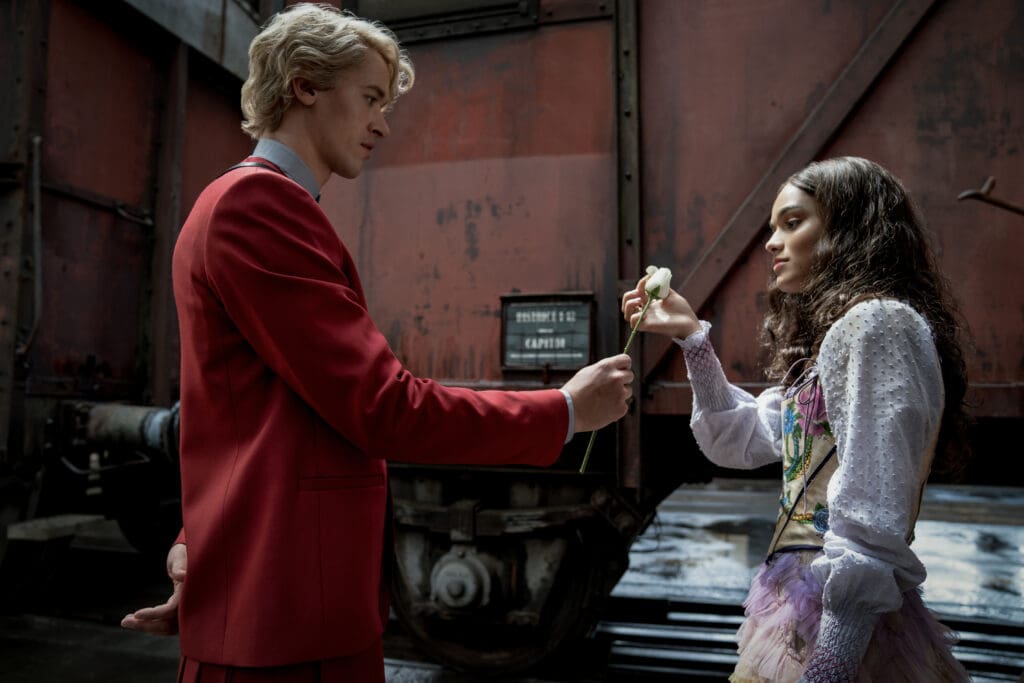
Naturally, it’s easy to feel sympathetic toward Snow, given what we learn about his circumstances. No one should have to be punished for wars that they played no part of, and in fact, no one should ever have to go through the trials of war at all. But it’s exactly that mentality that we as the audience are tricked into having, thinking that Snow can be fixed, he can be changed. This is all thanks to Tom Blyth’s performance, whether he’s letting his blonde curls shift and droop around, or he’s reeling us in with his uniformed looks in the later sections of the movie. The charisma that exudes from Blyth intoxicates the audience until the very end, when we’re reminded of who this boy becomes, and what he accomplishes.
But there’s no story of Snow without the lovely and ever-so talented Lucy Gray Baird, and there’s no denying that Rachel Zegler was the perfect and only choice for this character. Music is a key component of the story itself but also of Miss Baird’s overall character and development, as it’s typically through song that she expresses her deepest feelings and inner monologue. Zegler’s voice and facial expressions capture the essence of who Lucy Gray is, which frankly is more a mystery than anything else. If your biggest reservation about the film is Rachel Zegler, it might be time to set your qualms aside and enjoy her delightful yet powerful performance.
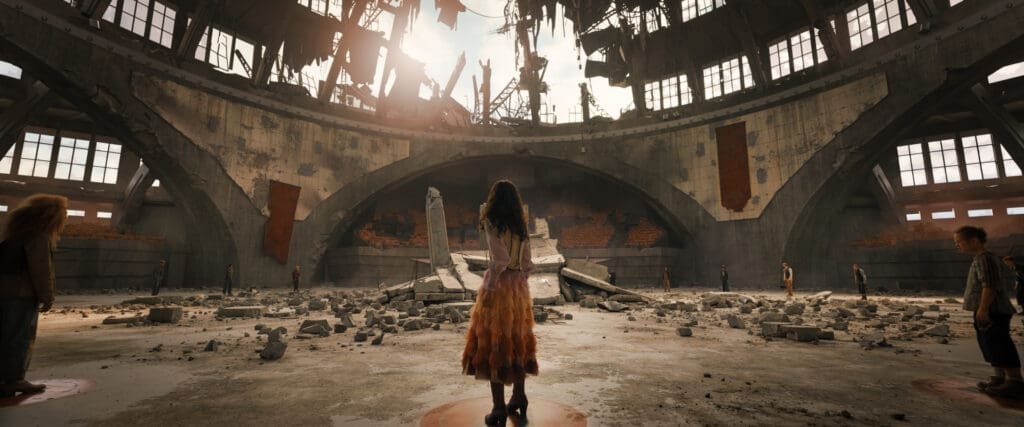
It goes without saying that book-to-film adaptations can have their issues and often lose part of what makes the original source material so worthwhile. In this case, there are several more moments and interactions missing from the book that would have served as supporting evidence when it comes to who Coriolanus Snow is and how he becomes the man we see decades later. In many ways, it may have been much more beneficial and reasonable to split the film into two as it would allow the audience to enjoy more of the story but also ponder over the events that occur. However, given the two hour and forty minute runtime, it’s clear that there were several difficult choices made in axing so many scenes for the final cut of the film. The Ballad of Songbirds and Snakes manages to depict the most important moments of the novel, while creating a fluid timeline of events that still give the audience an understanding of the risks, perspectives, and the conflicts that are present throughout the story.
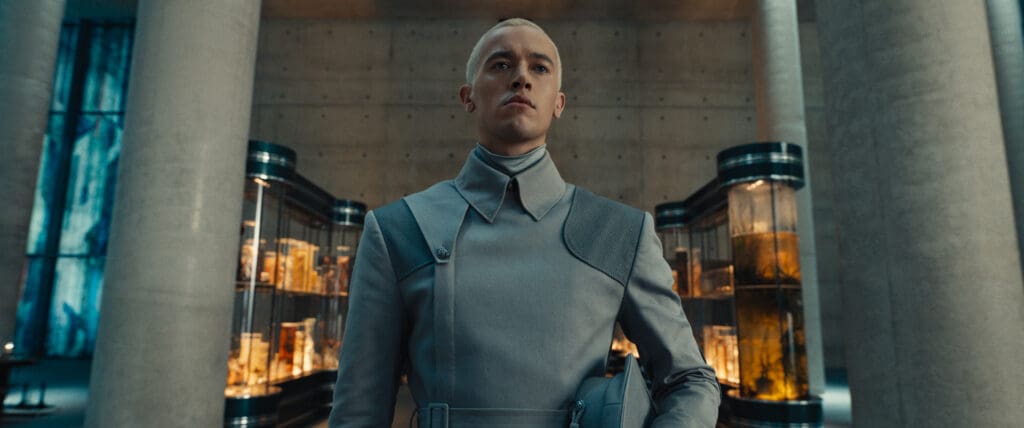
If you were or still are a fan of The Hunger Games, then its prequel film is a must-watch. Is it bizarre that the prequel follows Coriolanus Snow in his younger years? Sure. But is it done with purpose and in relation to our own lives and what we’re seeing everyday? Absolutely. The Ballad of Songbirds and Snakes is full of musical moments that are enjoyable but meaningful, and keeps us on our toes during moments of suspense, violence, and fear. It serves as a reminder that life should not solely be viewed as a spectacle, that our silence or lack thereof can easily affect the future, and that ultimately, that our choices make us who we are in the end.
Samosa Rating:
The Hunger Games: The Ballad of Songbirds and Snakes receives 4 out of 5 Samosas.
The Hunger Games: The Ballad of Songbirds and Snakes is now playing in theaters.
Runtime: 2hr 38m
If you want even more film discussions, reviews, or just some good old recommendations, be sure to follow @samosasandpopcorn on TikTok!


